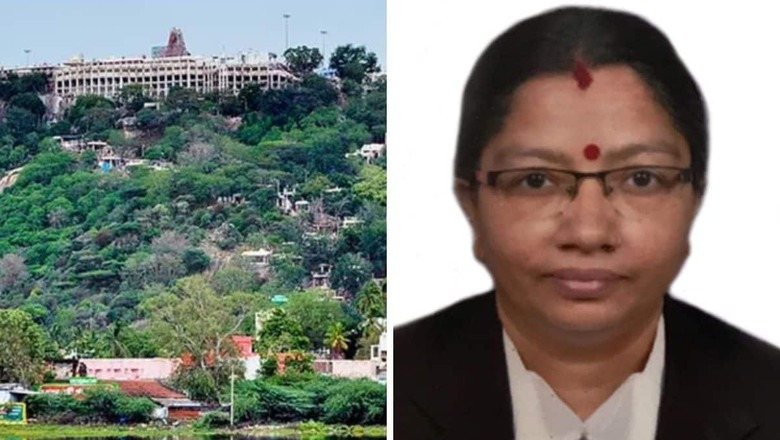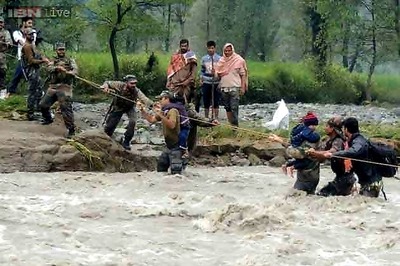
views
The Madras High Court on Tuesday ordered the Tamil Nadu (TN) Hindu Religious and Charitable Endowments Department (HR&CE) department to install boards in all Hindu temples, explicitly stating that non-Hindus are restricted from entering beyond the ‘Kodimaram’ (flagpole) area.
Justice S Srimathy issued the order while hearing a petition filed by D Senthilkumar, organiser of Palani or Pazhani Hill Temple Devotees Organisation, seeking directions for installation of such prohibitory boards and signages.
The respondents in the case were the TN government, commissioner of the HR&CE department and the Executive Officer of Arulmigu Palani Dhandayuthapani Swamy Devasthanam, Palani.
WHY THE PETITION WAS FILED
According to the petitioner, who also ran the ‘Shashti Toy Shop’ at Adivaram Pazhani, a few days ago, some non-Hindus purchased tickets at the Winch Station in Pazhani to reach the temple hilltop. One Shahul, who runs a fruit shop near Pazhani Bus Stand, brought his relatives who were wearing burqas and had bought tickets. When the ticket issuing authority noticed burqas, the authority retrieved the tickets as they are non-Hindus. But the said Shahul reportedly argued with the employees saying, “This is a tourist place. If non-Hindus are not allowed, then you should put up a banner, should I get some banners for you from my money.”
As the news spread, the devotees argued in support of the temple employees. Further, the devotees condemned the Arulmigu Palani Dhandayuthapani Swamy Devasthanam, Palani for failing to put the banner mentioning that non-Hindus were not allowed, which was removed during renovation work for Kumbabishekam of the temple. Following this, the banners were placed at the entrance, but removed again within a few hours. It was speculated that the temple authorities were under pressure from higher authorities to do so.
According to the petition, recently, a group of Muslims was found consuming non-vegetarian food on the Brihadeeswara Temple premises in Thanjavur. Another group was caught eating meet in Hampi Temple complex. A Muslim youngster was arrested after he offered namaz in a Hindu Temple in Uttar Pradesh.
#BreakingNews: Madras High Court directed the Tamil Nadu HR&CE department to install boards in all Hindu temples stating non-Hindus were not permitted beyond the 'Kodimaram' (flagpole) area in the respective shrines. @nimumurali with more@anjalipandey06 | #TamilNadu #Hindu pic.twitter.com/7liA7ENBNq— News18 (@CNNnews18) January 31, 2024
THE PALANI TEMPLE
The respondents further submitted that the Hill Temple of Arulmighu Dhandapani Swamy, Pazhani is mentioned in Thirumurugatruppadai (Sangam Literature) as the third abode of Lord Muruga of the six “Arupadai Veedu”.
The Moolavar is said to have been made of Navapashanam (nine poisonous materials). Not only Tamil Nadu, but devotees from all over the country, and even non-Hindus from foreign countries worship Lord Murugan. Devotees are allowed to reach the hill temple from the Giri Veethi path by Winch Service, Rope Car Service and footsteps as well as the elephant path.
WHAT IS A TEMPLE? WHO IS ALLOWED?
- The Temple Entry Authorisation Act, 1947, defines temple premises as sanctum and sanctorum in which people of other than Hindu religion are restricted.
- The Temple Entry Act under section 3 speaks about Hindus’ rights to enter temple. Rule 3(a) states that non-Hindus are not permitted to enter a temple.
- Under Section 10 of the HR&CE Act, the Commissioners, Joint Commissioners etc. shall be those professing the Hindu Religion and shall cease to hold office as such when they cease to do so. Under section 24 of the Act, non-Hindus are not permitted to enter the temple.
TN TEMPLES THAT ALLOW NON-HINDUS
Many temples in Tamil Nadu allow non-Hindus to enter.
The Arulmighu Meenakshi Sundareswarar Temple in Madurai provides entry to foreigners for a fee of Rs 50, restricting them to the Kodimaram of the temple.
In a similar instance, when a writ petition was filed seeking for a direction not to permit non-Hindus to enter the temple premises during the Kumbabishekam festival of Arulmighu Adikesavaperumal Thirukovil Thiruvattar Kanyakumari District, the Court had dismissed it saying: “…When a public festival like the Kumbabishekam of a temple is performed, it will be impossible for the authorities to check the religious identity of every devotee for the purpose of permitting his entry into the temple. That apart, if a person belonging to another religion has faith in a particular Hindu deity that cannot be prevented nor can his entry into the temple be prohibited…”
All foreigners and persons belonging to other faiths are allowed inside Arulmighu Brahadeeswarar Thirukovil, Thanjavur.
At Arulmighu Ranganathaswamy Thirukovil, Srirangam, there is a particular shrine for Bibi Nachiyar also called “Thuluka Nachiyar”, who was said to be the daughter of Mogul Emperor and even today, the presiding deity is offered “roti with butter” every morning.
There are other instances in Arulmighu Sowriraja Perumal Tirukkannapuram, Nagapattinam District and Bhuvarahaswamy Temple Srimushnam, Cuddalore District, where both the deities are taken in procession and they are halted before a mosque.
WHAT THE SC SAYS
In the Kalyan Das case, the Supreme Court had held that “it is well-known that there could be no such thing as an unregulated and unrestricted right of entry in a public temple or other religious institution, for persons who are not connected with the spiritual functions thereof”.
There can be restrictions in case of non-Hindus entering religious places of Hindus, likewise, there can be restrictions non-Christians entering churches by non-Christians or non-Muslims entering mosques and the same would not be violative of Article 15 of the Constitution which allows right to religion. In fact, these restrictions would ensure communal harmony among different religions and ensure peace in the society, the SC had said.
NON-HINDUS & THE MADURAI EXAMPLE
While the petitioner said non-Hindus should not be allowed from the entrance of the temple, the respondents’ contention, too, was they cannot be allowed, but from Kodimaram/Dhwajasthambham.
The court took note of the system at Meenakshi Sundareswarar Temple and other such temples where the temple administration takes an undertaking from a non-Hindu, stating he has faith in the deity and will follow the customs of the religion and temple.
Even non-Hindu foreigners, who enter by paying a fee, are not allowed beyond the Kodimaram/Dhwajasthambham.
‘NOT HURTING SENTIMENTS, NOT AGAINST CONSTITUTION’
The respondents stated that a Board indicating ‘Non-Hindus are not allowed’ would hurt the religious sentiments of those who would like to visit the temple.
The HC, however, said the respondents were confusing the issue. “If a non-Hindu is not having faith, declines to follow the customs and practices of the Hindu religion and the Temple, then the said non-Hindu cannot be allowed, and hence there is no question of hurting his sentiments.”
“On the other hand, if a non-Hindu, who declines to follow the customs and practices of the Hindu religion and the temple, is allowed inside the temple, it would affect the sentiments of the large number of Hindus practising the faith. This would affect the right of Hindus guaranteed under the Constitution of India. …In fact the Hindu Religion & Charitable Endowment Department is mandated to protect the Hindu religion, Hindu temples, its customs and practices, temple customs etc.”
The Constitution allows people to follow their religions. “…But the customs and practice of their respective religion cannot be in interference with and any interference ought to be curtailed. The Temple is not picnic spot or tourist spot. Even in Arulmighu Brahadeeswarar Temple, Thanjavur the other religion people are allowed to admire and appreciate the architectural monuments of the temple, but not after Kodimaram. While admiring the architectural monuments people cannot use the premises as picnic spot or tourist spot and the temples premises ought to be maintained with reverence and as per agamas. Therefore, the rights guaranteed under the Articles is not granting any right to the respondents to allow the other religion people, if they do not have any faith and belief in the Hindu religion. Moreover, the rights are guaranteed to all religions and there cannot be any bias in applying such right,” the court said.
“…the Hindus have a right to maintain their temples as per their customs, practices and Hindu Religious and Charitable Endowment Department is dutybound to protect temples from such unwanted incidents. In fact in the above narrated incidents, the Department had failed to protect the fundamental rights guaranteed under the constitution.”
The next contention of the respondents was that the Board need not be installed near the entrance of the temple, near Winch Station or Rope Car Station, as the same would not come within the temple premises. “This contention of the respondents cannot be accepted, as the entire Pazhani hill is considered as sacred/holy to the Hindus. Moreover if the Board is kept in the entrance like Gopuram or Winch station or Rope Car Station, it would be a warning to the non-Hindus. If a non-Hindu climbs all the way to the Hill and then it comes to the knowledge that non-Hindus are not allowed, it would frustrate him and he would question why it was not informed before climbing. In order to avoid such situations, it is imperative to install a board in the entrance itself and also at as many places as possible.”
NOT JUST PALANI TEMPLE
The respondents had submitted that the said writ petition is filed only for the Palani temple and the order may be restricted to the said temple alone. However, the HC said “it is a larger issue and the same ought to be applicable to all Hindu temples…” and the “restrictions would ensure communal harmony among different religions and ensure peace in the society”.
Therefore, the state government, HR&CE department, respondents and all persons who are involved in temple administration are directed to follow these directions:
- Install boards indicating that ‘Non-Hindus are not allowed inside temple after Kodimaram’ at the entrance of the temples, near Kodimaram and at prominent places near the premises.
- Not to allow non-Hindus who do not believe in Hindu religion.
- If any non-Hindu claims to visit a particular deity in the temple, obtain an undertaking that he has faith in the deity and would follow the customs and practices of Hindu religion and also abide by the temple customs.
- Whenever a non-Hindu is allowed based on the undertaking, it shall be entered in the register maintained by the temple.




















Comments
0 comment